Event Reports
Research Integrity Symposium "Dealing with research misconduct specific to the research field" (6 Dec '22)
The "Research Integrity Promotion Program of the Ministry of Education, Culture, Sports, Science and Technology (MEXT), Research Integrity Symposium - Dealing with research misconduct specific to the research field -" was held on 6 December, 2022 in a hybrid format in Tokyo and online, and was hosted by the Japan Society for the Promotion of Science (JSPS) and co-hosted by four founding agencies, including the Japan Science and Technology Agency (JST). In addition to deepening understanding of the characteristics of research misconduct that is likely to occur depending on the circumstances and problems in each research field, the lecture also presented research ethics education and matters that research institutions should address in order to prevent such misconduct.
Guest Greetings
Goal of Promoting Activities toward Research Integrity
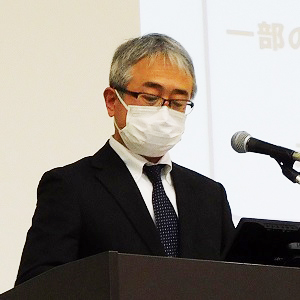
Keynote Speech
Keynote Speech 1 "Common Research Misconduct in the Field of Natural Sciences"
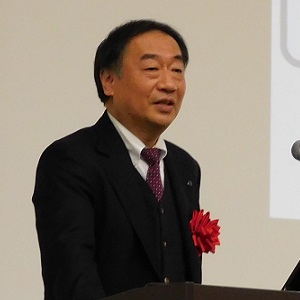
Professor Takehiko Sasaki (Professor at the Institute for Materials Research, Tohoku University) began by speaking about the characteristics of research activities in the natural science field in which he is involved: "collaborative research" and "collaborative work" by diverse groups of researchers and students. It is expected that there is a wide spectrum in terms of types of collaborative research and the concept of authorship, with some large standard research papers in the field of physics, for example, having more than 5,000 authors and 344 institutions involved. He said that it is necessary to enlighten and educate people to understand each difference.
With regard to "collaborative research," research results and paper presentations in laboratories are also collaborative research. However, the conventional way of thinking of "collaborative research" in science and engineering has always referred to collaborative research with other institutions, universities, and researchers from different affiliations in Japan and abroad. For this reason, it is necessary to pay particular attention to authorship (individual roles) within the same organization or laboratory. Considerations include the order of publication, responsibility for content, consent for manuscripts and submission, and double posts.
Based on these findings, he mentioned the recent trends of misconduct that are of concern: students' desire for recognition, such as "the temptation to show that they are 'capable students'," and young researchers' "temptation to improve their research results," and expressed the need for awareness and ethics education against such temptations. On the other hand, it is also necessary for senior researchers to improve their management awareness (understanding of the situation, penalties as checks and balances, etc.), and such efforts can act as an approach to promoting research integrity.
As an educational method, he also introduced the initiative of "PhD Development unit" for Ph.D. students in the experimental training program at Tohoku University. In addition, a method of group work using the instructional video "Gaps in Ethics" made by JST was introduced. Finally, Professor Sasaki said that it is important to create opportunities for ethical education tailored to the characteristics of the field and career, and to think about research misconduct as a personal matter.
Keynote Speech 2 "Common Research Misconduct in the Field of Humanities and Social Sciences"
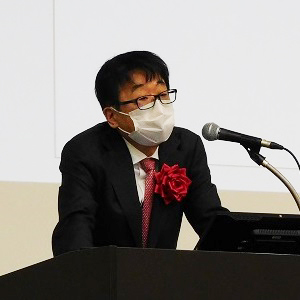
Professor Koichi Miki (Professor at the Keio University Law School) started by showing that research misconduct in the humanities and social sciences is predominantly plagiarism, and that all 34 cases of misconduct from FY2015 to FY2021 included plagiarism.
He then asked what the "protected interest" is as the reason why a double post is dishonest. He pointed out that the idea of double posting is greatly influenced by the characteristics and customs of each academic field, citing the differences between natural sciences versus humanities and sociology, or basic law vs positive law, and warned that it would be dangerous to generalize the problem of double posting across disciplinary boundaries of academic fields.
He also stated that the discussion and rule-making of double postings are progressing in the field of natural sciences, but they should not be brought into the field of humanities and social sciences without careful consideration, and it is necessary to consider rules for each specific academic field within the humanities and social sciences.
Furthermore, as a part that is easily misunderstood and not recognized, he explained the differences that "plagiarism" does not mean copyright infringement ( the protected interest of the rule prohibiting plagiarism is the "public interest"), and "copyright" is a right recognized by the author (the protected interest of the rule prohibiting copyright infringement is "private interest").
At the end of the lecture, Professor Miki concluded that "protected interest" under the rule of research integrity is to ensure mutual trust within the scientific community and to protect social credibility in scientific research.
Keynote Speech 3 "Research Ethics Education to Prevent Research Misconduct and Issues that Research Institutions should Address"
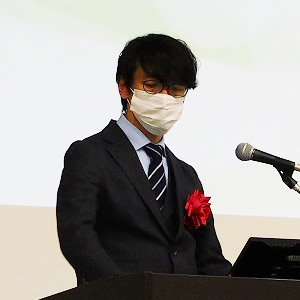
Professor Masaki Nakamura (Professor at the Center for Education in Liberal Arts and Sciences, Osaka University) first described the specific research misconduct "fabrication, falsification, and plagiarism (FFP)" as "research misconduct," followed by "gradation between these research misconduct (FFP) and questionable research practices (QRP)," which would not be research misconduct but result in a significant loss of credibility in research.
Next, he mentioned the issue of how we conduct research ethics education based on the characteristics of each research field with respect to issues that are specific and characteristic to the field and issues that are and are not likely to be revealed (the tip of the iceberg).
A Compendium of Near-Miss Incidents Related to Research Integrity by AMED, "5 Ways Supervisors Can Promote Research Integrity," posted on the leaflet prepared by the U.S. Office of Research Integrity (ORI), was introduced to provide specific examples.
- Be Available and Approachable
- Review Raw Data
- Communicate Your Expectations
- Provide Training and Guidance
- Know Your Research Integrity Officer
In addition, Professor Nakamura introduced the Questionnaire Survey on Research Integrity (2022.3) explaining the current situation in which research misconduct is likely to occur due to inadequate records and inappropriate storage of research data and materials, and the importance of utilizing research data based on the characteristics of the research field.
Finally, with regard to the following roles of each institution, he mentioned that clarification of rules in academic societies will change the size of the roles each person plays.
【Major organizational initiatives related to research integrity that are of particular importance】
Government: Support the development of research institute systems
Academic Associations: Clarify relevant regulations and rules, provide education and enlightenment in the field, cooperate with other academic associations
Universities & Research Institutions: Establishment of a consultation system regarding research integrity (people who are familiar with and readily available for consultation)
Provide effective research ethics education and monitoring of research integrity
Funding Agencies: Provide research ethics instructional materials and opportunities, and measures against research misconduct
Panel Discussions
In the panel discussion of the second portion, Mr. Tetsuya Mizumoto ( Executive Director of the JSPS) moderated the discussion by three lecturers (Professors Sasaki, Miki and Nakamura). A question and answer session was held with the participants about what kind of efforts should be made to "respond to research misconduct specific to the research field" based on the contents of the lectures so far.The lecture started with a question from Mr. Mizumoto, and the speakers talked about the characteristics of each field.
When asked, "Are there any cases of misconduct being uncovered in research presentations in laboratories?" Professor Sasaki replied, "Although we do not look at the raw data, senior researchers can point out any doubts about the data based on their experiences. It is important that senior researchers are able to participate in large laboratories (e.g., medical offices in medical schools), such as in medical schools."
Professor Nakamura was asked, "In Japan, FFP (the specific research misconduct) covers publications. However, in the United States, the scope is even broader than that of Japan (including non-published materials such as proposals, implementations, reports). Is there any idea to broaden the scope in Japan as well?" He replied stating, "It is quite possible it could happen. There needs to be a discussion (process) on where and how to handle it." Professor Sasaki was asked, "There were many cases of plagiarism and double posts in the humanities and social sciences, but what about in other fields?" His response was, "In the field of natural sciences, the expressions used in papers tend to be similar, if not plagiarized. The method (of the research paper) is a fixed format, and the similarity value (%) in the plagiarism check does not directly apply to plagiarism. Originality in the paper is important."
Professor Nakamura said, "The positioning of plagiarism in papers is different between humanities and sciences. For example, the scope of double post varies from field to field and citation is still important, so rules for each field need to be set." Professor Miki made his remarks based on the characteristics of each field saying that, "I think plagiarism occurs fairly often in the field of natural sciences. In one case in the natural sciences, copying and pasting was pointed out in a doctoral dissertation. There is tendency that plagiarism in the natural sciences is more common among young researchers, while plagiarism in the humanities and social sciences is more common among senior researchers."
This was followed by another question-and-answer session with questions from the participants, in which each speaker discussed the characteristics of each field and the development of human resources.
"Professor Nakamura's lecture emphasized the role of each institution, however, there aren't enough personnel who can teach on these topics at universities, and personnel in charge are replaced at ministries, funding agencies, and academic associations. What should we do to secure human resources?" In response to this question from the audience, Professor Nakamura replied, "It is a difficult problem to solve, and whether it is possible to increase the number of experts with research support personnel, such as URAs (University Research Administrators) will depend on how much we share knowledge on research misconduct investigation through horizontal connections."
Professor Sasaki said, "In the U.S., they are on a set plan, and I hope people in Japan can also make a plan that includes companies." According to Professor Miki, "It is better to separate the education and enlightenment part from the post-incident response to research misconduct. As education and enlightenment require empathy with students, selecting personnel who are close to them should be effective. I think it helps us to design an organization by narrowing down our objectives."
They were also asked, "What should researchers and students be aware of when it comes to double posting and authorship, even though each community has a different interpretation of misconduct?" Professor Nakamura said, "Authorship was proposed in the Montreal Declaration (WCRI). In collaborative research, authorship and acknowledgments should be agreed upon in advance and adjusted as the research progresses. It is important to recognize that double postings differ from field to field." Professor Miki added, "Research misconduct has highly field-dependent cases and those that are less field-dependent. FFP is less field-dependent. Since double posting and authorship are highly field-dependent, when conducting collaborative research with people from different fields, it is important to have a meeting at the start of the research or at the time of application, rather than meeting at the presentation phase." Professor Sasaki said, "I would at least like scientific journals to comply with the posting guidelines. Authorship is difficult to decide before you start working, and can be changed at the time of posting. Some of the journal's post guidelines are related to authorship, and confirmation of co-authors becomes more common."
Professor Miki also remarked that, "Currently, many journals do not have guidelines for double posting. Especially in the humanities and social sciences, it is rare to have any guidelines on double posting. It is natural that double posts and authorship should follow the rules, and I would like you to discuss the culture that lets people know the guidelines." Professor Miki added that, "In fact, 99.9% of the humanities and social sciences are not collaborative research, but rather solo writing. In addition, a lot of people in the field of humanities may not know about the authorship problem that is common to science researchers, and we need to let them know about it."
This symposium clarified the characteristics and issues in different research fields, regarding plagiarism, double posts, authorship, and others. The speakers shared the view that there is an urgent need to negotiate rules based on these characteristics and the status of research integrity efforts.
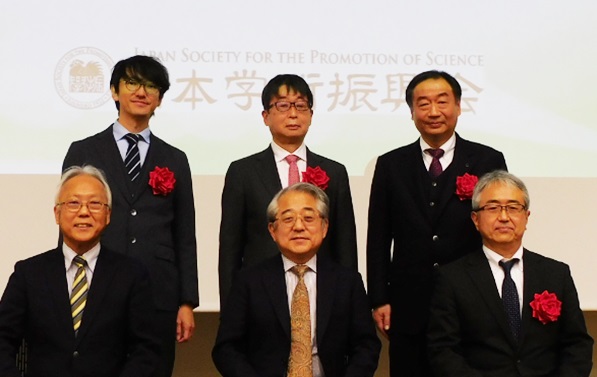
Mr. Mizumoto, Mr. Sugino(President, Japan Society for the Promotion of Science), Mr. Kobayashi

